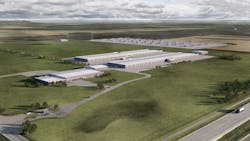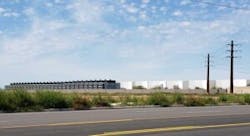Apple hopes to build up to 2 million square feet of data center space at its future campus in Waukee, Iowa, the company revealed in site plans filed with the local planning commission.
The filing comes more than four years after Apple announced the Waukee project, and envisions a campus with up to six data center buildings, each about the length of a Nimitz class aircraft carrier. Each building will span 315,773 square feet, which along with an administration building and maintenance facilities pushes the potential size of the campus to about 1.97 million square feet.
Apple’s plans for a data center in Waukee are scheduled for review by the city’s Planning and Zoning Commission Tuesday night, according to local media. The data center project, described as “Project Morgan,” is expected to create over 500 construction and operations jobs in Waukee. Apple is also supporting community infrastructure programs, including the creation of a 66-acre recreation area.
Apple originally planned to start construction in 2018 and bring the facility online in 2020. There have been multiple delays, and at one point Apple said it could be as long as 2027 before the project is ready. But local officials in Waukee say that Apple has since indicated it hoped to begin construction in 2022.
Data Center Building Boom in Iowa
The Apple data center was initially announced as a 400,000 square foot data center with an investment of about $1.3 billion. The site plans suggest a first phase of about that size, including one data center and a 63,000 SF administration building. But the plans also indicates future phases for five additional data center buildings.
Hyperscale data centers have grown steadily since 2017, with many cloud campuses exceeding 1 million square feet of space and 100 megawatts of capacity. That’s a sign of the booming Internet economy, which has taken a larger role in daily life during the COVID-19 pandemic. Apple relies on its data center infrastructure to support its iCloud storage, iPhone AppStore and delivery of music, podcasts and video.
The pending activation of the Apple project comes as Iowa is seeing a boom in data center construction, with Meta announcing plans to expand its Altoona campus to 5 million square feet, while Google says it has now invested more than $5 billion in its cloud campus in Council Bluffs.
Iowa is a popular destination for cloud infrastructure due to a confluence of factors that make it attractive to data centers, including its location, which provides low latency to deliver online services to the center of the country. The state has relatively low costs for land and utility power, and lower exposure to natural disasters than many areas of the nation, with low risk from hurricanes and earthquakes. Data center projects also benefit from incentive programs passed by the Iowa legislature.
Apple says it will be working with local partners to invest in renewable energy projects from wind and other sources to power the data center. Apple has pledged to power all of its global operations with 100 percent renewable energy, and has already reached that goal in the US and 23 other countries.
Closer Look: Apple’s Data Center Network
The Apple data center in Mesa, Arizona. (Photo: Rich Miller)
Apple has long been a leading global technology player, but has approached its data center infrastructure somewhat differently from its hyperscale counterparts Google, Microsoft, Amazon and Facebook/Meta. Through the early 2000s, Apple’s in-house infrastructure featured a data center on its Cupertino, Calif. campus, while the company used content delivery networks from Akamai and Limelight Networks to distribute iTunes content to its users around the globe.
In the mid-2000s it began building and leasing its own data centers to expand its network. Here’s a look at what we know about Apple’s data center infrastructure and its location from Apple releases and media coverage.
- Newark, Calif: In 2006 Apple paid $50 million to acquire a former MCI data center in Newark, Calif as it began to expand its infrastructure beyond its Cupertino campus.
- Maiden, North Carolina: The “iDataCenter” campus in Catawba County was the first company-built hyperscale data center, and at 500,000 square feet was one of the largest data centers at the time of its construction in 2009. Apple built several massive photovoltaic solar energy arrays to provider some of the power used by the huge server farm, along with a bank of Bloom Energy fuel cells. Apple has since added two additional data center buildings at the Maiden site.
- Prineville, Oregon: In 2012 Apple began building a data center in this town in Central Oregon, adjacent to a large Facebook data center campus in Prineville. The project has expanded in phases over the years, and now consists of at least two large data center buildings.
- Mesa, Arizona: In 2015 Apple began converting a large manufacturing facility in this Phoenix suburb into a 1.3 million square foot data center. The facility was previously operated by GT Advanced Technologies, which provided glass for Apple products. Mesa has since blossomed into a major destination for data centers, including existing sites for EdgeCore and NTT Global Data Centers, with plans for projects by Facebook, Digital Realty and CyrusOne.
- Reno, Nevada: Apple has built a substantial data center campus in Reno, Nevada that features at least 1.1 million square feet of data center space that has been built out in phases.
- Viborg, Denmark: In 2020 Apple launched its first data center in Europe, a 45,000 square meter (485,000 square feet) server farm. The facility is supported by a large solar array and 200-meter-tall wind turbines.
- Leased space: Apple operates wholesale data center space in third-party facilities in Ashburn, Virginia; Suburban Chicago and Santa Clara, Calif. A recent report from North American Data Centers said that in 2021 Apple leased 33 megawatts of capacity from providers, including 15 MWs in Ashburn and 15 MWs in Elk Grove Village in Suburban Chicago, and 3 MWs in Austin, Texas.
The Iowa project is not the only Apple data center that has been delayed. In 2015, Apple announced plans to build a large data center in Galway, Ireland supported by renewable energy. But the project encountered resistance by some local residents and rival builders. At one point the project appeared to be dead, but last year Apple gained an extension through 2026 to file new plans for the data center.
About the Author




